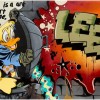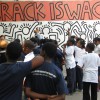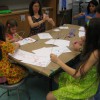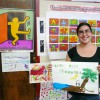- Keith Haring Murals in San Sebastián
- Keith Haring Murals
- Come To Know Keith Haring
- Organ Systems Mural
- City as Canvas: Artist Spotlight
- Printing with Objects
- Mural Making in the Style Of Keith Haring
- Subway Graffiti Project
- T-shirt Designer
- Keith Haring Semiotics Poster
- Introducing Keith Haring
- Discovering Keith Haring
- Haring Inspired Mural
- All Bottled Up!
- Thinking about Drawings as Symbols
Location | New York, New York
City as Canvas: Artist Spotlight

This guide is intended to be used as a resource for teachers either preparing to visit the Museum of the City of New York’s City as Canvas: Graffiti Art from the Martin Wong Collection or to use in the classroom following a class visit.
During the gallery tour of the City As Canvas exhibition, students will view highlights from the Museum's rich collection of 1970s and '80s graffiti art in New York. By analyzing the drawings, paintings, photographs and blackbooks collected by Martin Wong, students will learn about New York City artists known as “writers”, like Keith Haring, Lady Pink, Lee Quiñones, and Daze, and the historical context in which their work was created. Students will be able to elaborate on the multiple perspectives surrounding street art, discuss the various styles represented, and will respond creatively to the pieces by drafting their own sketches.
The information and activities in this guide correlate to the guided tour, but may also be taught as stand-alone lessons utilizing the text, images, and suggested activities. Teachers are encouraged to adapt the information to the grade level and ability of their students. For further information or to schedule a visit to the Museum of the City of New York, please email the Frederick A.O. Schwarz Children’s Center at schoolprograms@mcny.org
Creation and Expression
Reflecting on Text and Context in Art
What does art tell us about the time and place of its creation, and what does the context tell us about an artwork? In this lesson, students consider the work of Keith Haring in the late 1970s and early 1980s, which can be used as a framework for studying any artist and era. Students research historically and culturally significant events as a potential means to understand artists and their works. They create and present slide shows that incorporate images of the work with commentary that place the pieces in their historical and cultural context. Finally, they trace the legacy of their chosen artist via the work of artists who came later or their effect on culture.
Studying Mural: “Crack is Wack”

Haring's 2-sided mural on a handball court at 128th Street & 2nd Avenue in NYC overlooks the FDR drive. A public site that has brought much acknowledgement since it was painted in 1986. This lesson, organized collaboratively with The Children's Storefront gives local students the opportunity to examine and reflect on one of Haring's most influential landmarks.
Ten
Using Keith Haring's book, TEN as a starting point, children will learn to quantify and visually depict numbers.
Stories
Similar to the book, I WISH I DIDN'T HAVE TO SLEEP, containing children's responses to Haring's work, students are encouraged to look at Haring's work, and create their own stories.
Snapshots
Inspired by work Haring explored throughout his life, this project asks students to photograph one another and reflect upon what they see both externally and internally.
Small
Using Keith Haring's book, BIG, Children will write and illustrate all the words they know for the word small.
Red and Blue
This collaborative project, inspired by a set of prints Haring made titled, RED AND BLUE, asks children to interpret classmates' abstract shapes and write or tell a story about them.

